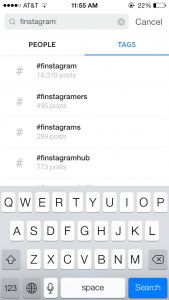The Gemini Effect: The Two Faces of Instagram
 Although Facebook is the social network most commonly associated with teenagers, Instagram has given Mark Zuckerberg a long run for his money. Peaking at seventy-eight million users this year, the photography based network has superseded all others to become the most used form of social media today. With a following twice the size of Canada’s population, it is not surprising that the popular smartphone application has teenagers feeling scared and self-conscious. A whopping ninety percent of Instagram users are, in fact, adolescents, who are very aware that their posts on the internet can make or break their high school social life. Providing over forty-one different filters and effects, the app almost begs its users to manipulate their own photos. These options actually add on to the pressure of online perfection, rather than alleviate it, causing many to abandon their accounts altogether. Others, however, have started a trend that truly exposes the controlling effects of this pressure: finstagram.
Although Facebook is the social network most commonly associated with teenagers, Instagram has given Mark Zuckerberg a long run for his money. Peaking at seventy-eight million users this year, the photography based network has superseded all others to become the most used form of social media today. With a following twice the size of Canada’s population, it is not surprising that the popular smartphone application has teenagers feeling scared and self-conscious. A whopping ninety percent of Instagram users are, in fact, adolescents, who are very aware that their posts on the internet can make or break their high school social life. Providing over forty-one different filters and effects, the app almost begs its users to manipulate their own photos. These options actually add on to the pressure of online perfection, rather than alleviate it, causing many to abandon their accounts altogether. Others, however, have started a trend that truly exposes the controlling effects of this pressure: finstagram.
An increasingly popular outlet, a finstagram is a fake, private Instagram account that is only shared with a person’s close friends. Controversial in practice, but fascinating in concept, a finstagram account allows one to be honest with a small group, while simultaneously cultivating his or her seemingly flawless online persona with the majority. Hills West senior, Athena Priftakis, says that her finstagram account allows her to post anything that she wants “free of the judgement” of her peers. However, while many have similarly jumped onto the bandwagon, others have began to question the idea completely: have the hidden politics of social media gone too far this time?
Although seemingly harmless at first, a finstagram might actually be more trouble than it is worth. For example, it requires one to manage two accounts at the same time, which can lead to users spending twice the amount of time on the social media platform. With Instagram already taking the cake as the leading distraction for students in schools, is it really a good idea to encourage this increase in usage? The psychological analyses of Instagram are also astoundingly negative. U.S. Magazine has stated that the app “accentuates the worst parts” of other social networking sites, causing a noticeable warp in a person’s self-perception and self-esteem as it makes it so simple to quantify success into the form of “likes” on a post. What differentiates the success of an Instagram post from that of a finstagram? Originally, finstagram was created to be the “Instagram revolution”; the solution to the stressful social media problem, but is it really a cure, or is it just another spoonful of sugar made to help the bitter pill go down?








